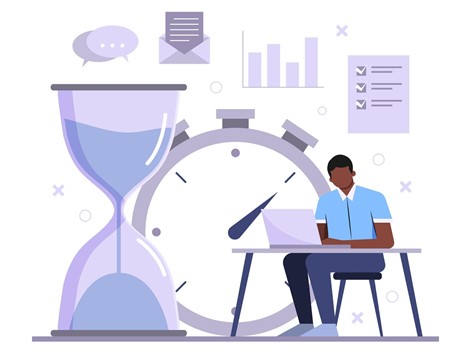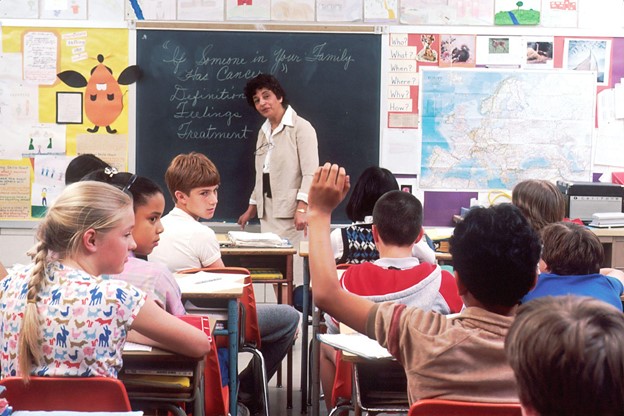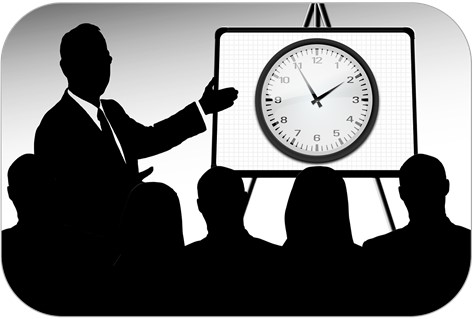In the education world, teachers have a lot of things to do every day. They teach lessons, manage the class, help students, and check their performance. It can be overwhelming. That's why time management is important for teachers.
Time management helps teachers do their job well and still have time for their personal life. They have a lot of things to do in a limited time. They must plan lessons, talk to students, and work together with other teachers.
Lacking time management skills for teachers can create problems for teachers. It may make them feel overwhelmed and increase stress levels. Yet, teachers can use proven time management techniques to optimize their productivity. This, in turn, will reduce stress and create a more engaging learning environment.
This article will give essential tips and strategies that can empower teachers and education staff to manage their time.
In this article

Effective time management for teachers has a significant impact on both teaching and learning outcomes. Here are some ways in which time management directly influences the educational experience:
When teachers manage their time well, they can get more things done efficiently. They know what tasks are most important, plan their schedules, and use their time wisely.
This means they can make better lesson plans, give feedback on assignments quickly, and have better control of the class. This creates a better learning environment for students.
Time management allows teachers to dedicate enough time to everything. This includes lesson planning, research, and preparation. This helps them create interesting and well-organized lessons that meet the needs of students.
Good time management also lets teachers use creative teaching methods to make learning more interesting, fun and effective.

If teachers have sufficient time, they can give special attention to all children. Different people learn at different rates.
So, if you can understand everyone’s pace, you can give them extra attention to overcome their weaknesses.
Time management also helps teachers grow professionally. They can take part in workshops, conferences, and training to learn new things. By spending time on their own learning, teachers can get better at teaching and know more about their subjects. This makes the education they provide even better for students.
So, when teachers are good at managing time, they create a great learning environment. Students get well-prepared lessons, special attention, and a class that feels supportive. This makes them do better in school and learn more.

If you are a teacher, you understand the need for effective time management strategies to make the most of your time at the school. Here are some great time management tips for teachers.

Organizing the day’s priorities is a fundamental aspect of time management for teachers. It involves setting clear goals and structuring the day around the most important tasks.
This helps teachers stay focused and productive even when faced with unexpected challenges or a heavy workload.
Effective prioritization goes beyond ranking tasks based on their subject or content. It requires teachers to consider the overall impact and significance of completing each task. They need to assess whether certain projects can be temporarily postponed if their outcomes do not hold as much importance as others.
It's important to remember that priorities aren't always just about focusing on subjects like Math and English over arts projects. Sometimes, arts or outdoor activities are just as important as academic lessons.
Teachers need to understand that learning comes in many different forms. When teachers balance their priorities, they can create a learning environment that helps students grow in all areas.
Embrace technology tools and apps that can make tasks easier and save time. Try using special computer programs or tools to help with planning lessons, grading, and keeping records. Teachers can also use email or messaging apps to talk to students, parents, and other teachers easily.
Technology can help teachers do repetitive tasks automatically and work together easily. This gives them more time to teach and help students. Additionally, teachers can use smart boards in class to make things more fun. Children love to learn in an engaging environment.
Moreover, visual presentations always help a student’s mind to remember better.
Some schools also provide tablets to their students for better learning. If your school also has such technological advantages, you can use them to their best potential. Learning from the book can be boring. But if you involve videos and presentations, it can be fun for students to learn.
Teachers can avoid procrastination by grading their work in smaller parts instead of all at once. It's better to do a few assignments each day instead of trying to do the whole class's work at once. This helps prevent a big pile of grading tasks from building up.
Grading assignments in smaller batches offers several benefits. Firstly, it makes the workload more manageable and less daunting. Teachers can take their time to give helpful feedback on each assignment and assess it properly.
Also, finishing a smaller batch of grading tasks each day gives teachers a sense of accomplishment.
To stay focused on their goals, teachers need to be prepared and plan for potential problems in the classroom. Some issues, like natural disasters, may not have many solutions, but teachers can still plan to help their students.
When it comes to student behavior problems, it's best to prevent them from getting worse and taking up class time.
One good strategy is to gather information about the students before they come to class. This helps teachers plan to deal with any challenges that might come up and take steps to prevent problems.
By being proactive, teachers can reduce distractions and keep the classroom a positive place for learning.
Time blocking is one of the best time management strategies for teachers. It involves setting aside dedicated time blocks for specific activities.
For example, you can allocate a specific time every day for lesson planning, grading, and responding to emails. This helps you minimize distractions and ensure that you give importance to the significant tasks.
Time blocking also helps in better planning and organization. You can map out the day and assign dedicated time slots to different activities. Teachers can have a clear overview of their schedule and ensure that important tasks are not overlooked or rushed. It helps them be on track and meet deadlines, reducing stress and increasing overall productivity.
Teachers have a lot of responsibilities and often focus on the needs of students and parents. It might be tempting to spend free time grading and taking care of student requirements, but it's important to also take time for themselves.
Taking personal time is one of the important time management techniques for teachers. It is crucial for successfully carrying out educational plans and helping students succeed. If teachers neglect their own well-being and don't take care of themselves, they can become exhausted, and it can affect how well they teach.
Even the best time-saving strategies only work when teachers are energetic, healthy, and relaxed.
Self-care helps teachers keep things in perspective. It helps them recharge their energy and approach their work with enthusiasm.
Teachers and students can benefit from homework that involves practicing the same things over and over again. It's better to do this kind of homework at home because it takes a lot of time.
Doing repetitive practice in class can use up valuable time that could be spent on other important things.
Assignments that just ask students to do a certain number of problems don't add much value if they take up too much class time. Instead, teachers can plan homework that helps students practice what they've learned at home.
By carefully planning homework, teachers make sure that class time and homework have different purposes. This helps students learn better. Homework gives them a chance to practice on their own, think about what they've learned, and use it in different ways. In class, they can dive deeper into the subjects, ask questions, and learn to think critically.
When teachers manage their time well, it helps them be better at their job and helps students learn better too. Time management means organizing their schedule, deciding what tasks are important, and breaking them into smaller parts. When teachers do this, they can get more done in less time. It means they can plan their lessons well, give feedback on time, and keep the class under control. This makes learning more fun and structured for students.
